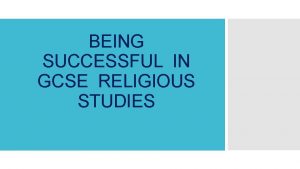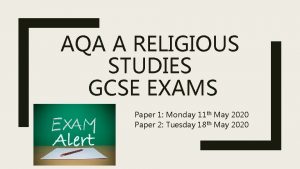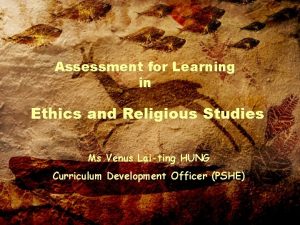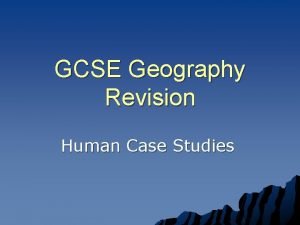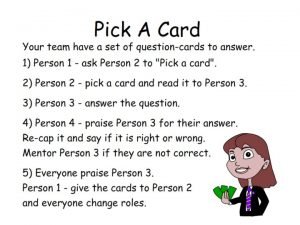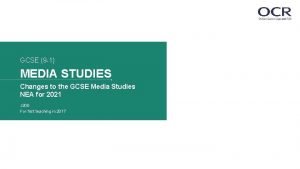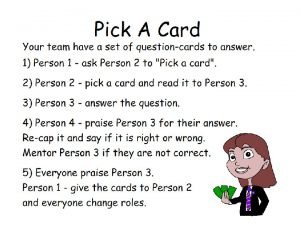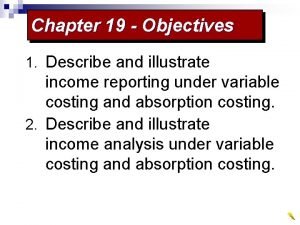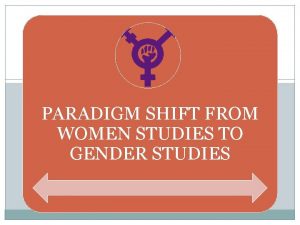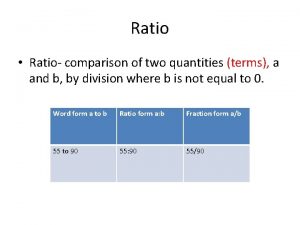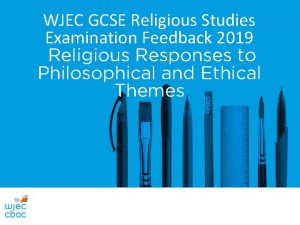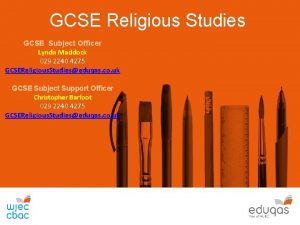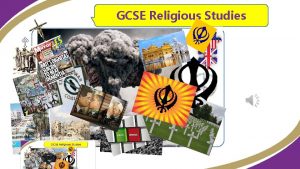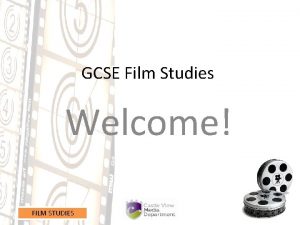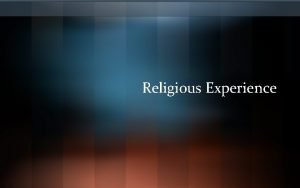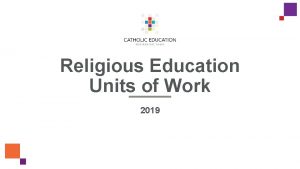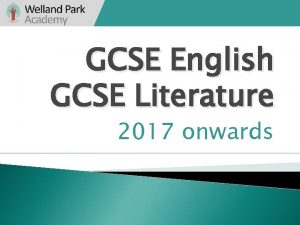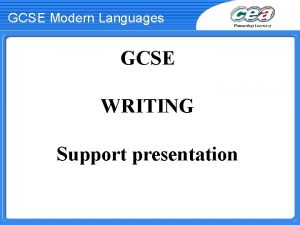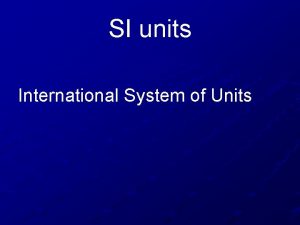GCSE Religious Studies Different units of study There




















- Slides: 20

GCSE Religious Studies Different units of study…. .

There are lots of good reasons to study RS in depth! Note taking Critical/abstract thinking – needed for all subjects Benefits of RS How to form an argument- tested in GCSE’s Develop my knowledge of current affairs – needed for all subjects especially English. d Argue an evaluate Public speaking - Needed for English or drama GCSE Can RS help me get a job? To get a job or into college you need GCSEs therefore a GCSE in RS is one step towards the future you want. RS is a great qualification for any job that involves working with people, as RS helps you understand people and why they act in the way you do. No Coursework! When you get a job, go to university or travel there will be people from different faiths and backgrounds. RS will help you understand the people you meet so you can get on in life.

Key Skills required. . . • Discussing - giving your own ideas and opinions. • Arguing /debating from different points of view. • Remembering key words and meanings. • Understanding new ideas, beliefs and worldviews. • Using religious ideas, beliefs and teachings to back up a point of view. • Writing evaluative answers about moral issues using opinions, examples and beliefs. • Reflecting on your own ideas and experiences and those of others.

WJEC Eduqas GCSE in Religious Studies – Route A

Component 1: Thematic studies FOUR religious, philosophical and ethical studies in the modern world We will be studying Theme 1: Issues of Relationships Theme 2: Issues of life and death. Theme 3: Issues of good and evil. Theme 4: Issues of human rights. How it's assessed • Written exam: 2 hours • 120 marks (plus 6 marks for spelling, punctuation and grammar (SPG)) • 50% of GCSE Questions Each theme has a common structure of one four-part question of 2, 5, 8 and 15 marks. Each theme is marked out of 30. 5

Component 2: The study of religions: beliefs, teachings and practices How it's assessed • Written exam: 1 hour • 60 marks (plus 6 SPG marks) • 25% of GCSE Questions Each religion has a common structure of two four-part questions of 2, 5, 8 and 15 marks. 6

Component 3: The study of religions: beliefs, teachings and practices How it's assessed • Written exam: 1 hour • 60 marks • 25% of GCSE Questions Each religion has a common structure of two four-part questions of 2, 5, 8 and 15 marks. 7

Theme 1 : Issues of Relationships We will be studying Theme 1: Issues of Relationships Theme 2: Issues of life and death Theme 3: Issues of good and evil Theme 4: Issues of human rights 8

Theme 1 : Issues of Relationships Areas of Study Relationships Beliefs, attitudes and teachings about the nature and purpose of relationships in the twenty first century: families, roles of women and men, marriage outside the religious tradition and cohabitation The nature and purpose of marriage as expressed through marriage ceremonies in Britain and teachings Varying attitudes towards adultery, divorce and annulment and separation and re-marriage Sexual relationships Teachings about the nature and purpose of sex and the use of contraception Diverse attitudes within and across traditions towards same sex relationships, Issues of equality: gender prejudice and discrimination Diverse attitudes toward the roles of women and men in worship and authority Teachings / interpretations of teachings 9

Theme 2 : Issues of Life and Death We will be studying Theme 1: Issues of Relationships Theme 2: Issues of life and death Theme 3: Issues of good and evil Theme 4: Issues of human rights 10

Theme 2 : Issues of Life and Death Areas of Study The world Diverse beliefs, teachings and attitudes about the accounts of the origin of the universe The relationship between religious views and non-religious views of creation and the extent to which they conflict / concur; Stephen Hawking's view of the Big Bang Religious and non-religious beliefs, teachings and attitudes about dominion, stewardship, environmental responsibility, sustainability, and global citizenship 'Humanists for a Better World' The origin and value of human life Diverse beliefs, teachings and attitudes toward the origin and sanctity of human life Non-religious beliefs about evolution; Charles Darwin, Richard Dawkins Diverse religious attitudes towards abortion and euthanasia Non-religious views on the importance of human and animal life; Peter Singer's views on 'speciesism' Humanist 'Dignity in Dying' Movement Beliefs about death and the afterlife Beliefs and teachings about life after death Diverse beliefs about the afterlife / rebirth How religious and Humanist funerals in Britain reflect beliefs about the afterlife 11

Theme 3 : Issues of Good and Evil We will be studying Theme 1: Issues of Relationships Theme 2: Issues of life and death Theme 3: Issues of good and evil Theme 4: Issues of human rights 12

Theme 3 : Issues of Good and Evil Areas of Study Crime and Punishment What makes an act 'wrong'/ unskilful? Religious and ethical responses: relative and absolute morality, conscience, virtues, sin Beliefs and attitudes about the causes of crime and the aims of punishment: justice, retribution, deterrence and reformation The treatment of criminals and the work of prison reformers and prison chaplains Varied responses to the Death Penalty, including Forgiveness teachings about forgiveness Examples of forgiveness arising from personal beliefs. Good, Evil and Suffering Philosophical perspectives on the origin of evil (Philosophical challenges posed by belief in God, free will and the existence of evil and suffering) 13

Theme 4 : Issues of Human rights What rights should humans have? Are some People more valuable than others? We will be studying Theme 1: Issues of Relationships Theme 2: Issues of life and death Theme 3: Issues of good and evil Theme 4: Issues of human rights What is freedom? What happens when human rights are ignored? 14

Theme 4 : Issues of Human rights Areas of Study Human Rights and Social Justice Beliefs, teachings and attitudes toward the dignity of human life Practices to promote human rights including equality: agape in action An example of conflict between personal conviction and the laws of a country Censorship, freedom of religious expression and religious extremism Prejudice and discrimination Beliefs, teachings and attitudes towards prejudice and discrimination Beliefs, teachings and attitudes towards racial prejudice and discrimination, including Martin Luther King's teachings on equality Issues of wealth and poverty Ethical considerations about acquisition and use of wealth The actions and attitudes of charities in twenty first century Britain whose aim is to alleviate poverty 15

Assessment objectives These are the skills that are being tested. AO 1 is tested in questions a-c and requires you to describe and explain; showing differences, reasons for views and examples. AO 2 is tested in question d and requires you to argue with different views and supported reasons; to break the idea down into parts and to weigh up the ideas. AO 1 Demonstrate knowledge and understanding of religion and belief*, including: beliefs, practices and sources of authority • influence on individuals, communities and societies • similarities and differences within and/or between religions and beliefs AO 2 Analyse and evaluate aspects of religion and belief*, including their significance and influence • * The term ‘belief’ includes religious and non-religious beliefs as appropriate to the subject content requirements The Exam Question Format All questions are in the same format across all three exam papers. There is very little difference in the mark descriptors for each paper. a) Questions - 2 marks – AO 1 A short question which gives one mark if it is vague and 2 marks for accurate and detail You MUST write in full sentences Hint: sometimes an example will help you get the second mark 16

b) Questions - 5 marks – AO 1 Band Descriptor Mark 3 An excellent, coherent answer showing knowledge and understanding of the religious idea, belief, practice, teaching or concept. Excellent understanding of how belief influences individuals, communities and societies. Uses a range of appropriate religious/specialist language and terms and sources of wisdom and authority extensively, accurately and appropriately. 4 – 5 2 A good, generally accurate answer showing knowledge and understanding of the religious idea, belief, practice, teaching or concept. A good understanding of how belief influences individuals, communities and societies. Uses religious/specialist language and terms and/or sources of wisdom and authority generally accurately. 2 – 3 1 A limited statement of information about the religious idea, belief, practice, teaching or concept. A limited understanding of how belief influences individuals, communities and societies. Uses religious/specialist language and terms and/or sources of wisdom and authority in a limited way. 1 0 No relevant information provided. 0 Band 17

c) Questions - 8 marks – AO 1 Band 4 3 2 1 0 ** The phrase ‘the diversity of (the religious idea…)’ is in italics as this is only present required in the c) questions for Component 1 where it asks for reference to TWO traditions or religions. Band Descriptor Mark An excellent, highly detailed explanation showing knowledge and understanding of the diversity of the 7 – 8 religious idea, belief, practice, teaching or concept. An excellent understanding of how belief influences individuals, communities and societies. Uses a range of religious/specialist language, terms and sources of wisdom and authority extensively, accurately and appropriately. A very good, detailed explanation showing knowledge and understanding of the diversity of the religious 5 – 6 idea, belief, practice, teaching or concept. A very good understanding of how belief influences individuals, communities and societies. Uses a range of religious/specialist language, terms and sources of wisdom and authority accurately and appropriately. A good, generally accurate explanation showing some knowledge and understanding of the diversity of 3 – 4 the religious idea, belief, practice, teaching or concept. A good understanding of how belief influences individuals, communities and societies. Uses religious/specialist language and terms and/or sources of wisdom and authority generally accurately. A limited and/or poorly organised explanation showing limited knowledge and understanding of the 1 - 2 diversity of the religious idea, belief, practice, teaching or concept. A limited understanding of how belief influences individuals, communities and societies. Uses religious/specialist language, terms and/or sources of wisdom and authority in a limited way No relevant information provided. 0 18

d) Questions - 15 marks – AO 2 – the italics concern only component 1. 2 d (Life and Death) Band Descriptor Mark 13 – 15 5 An excellent, highly detailed analysis and evaluation of the issue based on detailed knowledge of religion, religious teaching and moral reasoning to formulate judgements and present alternative or different viewpoints. An excellent understanding of how belief influences individuals, communities and societies. An excellent, highly detailed consideration of non-religious beliefs, such as those held by humanists and atheists. Uses and interprets religious/specialist language, terms and sources of wisdom and authority extensively, accurately and appropriately. 4 A very good, detailed analysis and evaluation of the issue based on accurate knowledge of religion, religious teaching and moral reasoning to formulate judgements and present alternative or different viewpoints. A very good understanding of how belief influences individuals, communities and societies A very good, detailed consideration of non-religious beliefs, such as those held by humanists and atheists. Uses and interprets religious/specialist language, terms and sources of wisdom and authority appropriately and in detail. 10 – 12 3 A good, generally detailed analysis and evaluation of the issue based on a generally accurate knowledge of religion, religious teaching and moral reasoning to formulate reasonable judgements and recognise alternative or different viewpoints linked to religion and belief. A good understanding of how belief influences individuals, communities and societies A good, reasonably detailed consideration of non-religious beliefs, such as those held by humanists and atheists. Uses and interprets some religious/specialist language, terms and/or sources of wisdom and authority Limited statement(s) of more than one viewpoint based on limited knowledge of religion, religious teaching and moral reasoning to formulate judgements. A limited understanding of how belief influences individuals, communities and societies. A limited consideration of non-religious beliefs, such as those held by humanists and atheists. 7 – 9 2 1 0 Uses limited religious/specialist language, terms and/or few sources of wisdom and authority A poor, basic statement of a point of view and a very limited attempt, or no attempt to formulate judgements or offer alternative or different viewpoints. Tenuous attempt or no attempt made to demonstrate how belief influences individuals, communities and societies. A very basic consideration or no consideration of non-religious beliefs, such as those held by humanists and atheists. Poor use or no use of religious/specialist language, terms and/or sources of wisdom and authority. No relevant point of view stated. 4 – 6 1 – 3 19 0

SPAG – Spelling, Punctuation and Grammar This is only tested in TWO questions: 1. 1 d (Relationships) and 2. 1 d (Christianity) It is not assessed in paper 3 (Buddhism) Band Performance descriptions High • Learners spell and punctuate with consistent accuracy performan • Learners use rules of grammar with effective control of meaning ce overall 5– 6 marks Intermedia • te • performan ce Learners spell and punctuate with considerable accuracy Learners use rules of grammar with general control of meaning overall 3– 4 marks Threshold • performan • ce Learners spell and punctuate with reasonable accuracy Learners use rules of grammar with some control of meaning and any errors do not significantly hinder meaning overall 1– 2 marks 0 • • • The learner writes nothing The learner’s response does not relate to the question The learner’s achievement in SPa. G does not reach the threshold performance Band, for example errors in spelling, punctuation and grammar severely hinder meaning 20
 Re past papers eduqas
Re past papers eduqas Rs aqa gcse past papers
Rs aqa gcse past papers Religious studies assessment
Religious studies assessment Eduqas religious studies a level past papers
Eduqas religious studies a level past papers Eduqas gcse media
Eduqas gcse media Ocr business studies gcse past papers
Ocr business studies gcse past papers Human geography revision
Human geography revision Gcse business studies resources
Gcse business studies resources Gcse media studies past papers
Gcse media studies past papers Gcse media studies nea 2021
Gcse media studies nea 2021 Ccea gcse business studies
Ccea gcse business studies Ocr gcse business studies
Ocr gcse business studies Purpose of market research gcse
Purpose of market research gcse Margin of safety gcse
Margin of safety gcse Gcse business studies unit 1
Gcse business studies unit 1 What is delayering
What is delayering Botox crow's feet injection sites
Botox crow's feet injection sites Variable costing income statement
Variable costing income statement Paradigm shift from women studies to gender studies
Paradigm shift from women studies to gender studies What are storage device
What are storage device What is a ratio comparing two different quantities
What is a ratio comparing two different quantities
